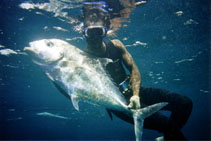Scyris alexandrina (GeoffroySaint-Hilaire, 1817)
Alexandria pompano
Upload your photos and videos
Pictures | Google imageScyris alexandrina
Picture by Camrrubi, J.-F.
Pictures | Google imageScyris alexandrina
Picture by Camrrubi, J.-F.
Benin country information
Common names:
Fofoe, Houngogbakannon
Occurrence: native
Salinity: marine
Abundance: | Ref:
Importance: | Ref:
Aquaculture: | Ref:
Regulations: | Ref:
Uses: no uses
Comments:
National Checklist:
Country Information: https://www.cia.gov/library/publications/resources/the-world-factbook/geos/bn.html
National Fisheries Authority:
Occurrences: Occurrences Point map
Main Ref: Bauchot, M.-L., 1987
National Database:
Occurrence: native
Salinity: marine
Abundance: | Ref:
Importance: | Ref:
Aquaculture: | Ref:
Regulations: | Ref:
Uses: no uses
Comments:
National Checklist:
Country Information: https://www.cia.gov/library/publications/resources/the-world-factbook/geos/bn.html
National Fisheries Authority:
Occurrences: Occurrences Point map
Main Ref: Bauchot, M.-L., 1987
National Database:
Common names from other countries
Classification / Names ຊື່ສາມັນ | ຄຳສັບຄ້າຍຄືກັນ | Catalog of Fishes(ຕະກຸນ, ຊະນິດ) | ITIS | CoL | WoRMS | Cloffa
Environment: milieu / climate zone / depth range / distribution range ນິເວດວິທະຍາ
ສັດທະເລ; ລະດັບຄວາມເລິກ ? - 70 m (Ref. 2683). Subtropical; 42°N - 13°S, 19°W - 36°E
ການແຜ່ກະຈາຍ ປະເທດ | ເຂດ FAO | ລະບົບນິເວດ | ການປະກົດຕົວ | Point map | ການແນະນຳ | Faunafri
Eastern Atlantic: off Morocco to Angola (Ref. 4225, 57392), including southern parts of the Mediterranean (Ref. 4225).
ຂະໜາດ / ນ້ຳໜັກ / Age
Maturity: Lm ? range ? - ? cm
Max length : 100.0 cm TL ຕົວຜູ້/ບໍ່ມີເພດ; (Ref. 27584); common length : 60.0 cm TL ຕົວຜູ້/ບໍ່ມີເພດ; (Ref. 3397); ນ້ຳໜັກສູງສຸດທີ່ເຄຍຈັດພີມມາ: 3.2 kg (Ref. 40637)
Max length : 100.0 cm TL ຕົວຜູ້/ບໍ່ມີເພດ; (Ref. 27584); common length : 60.0 cm TL ຕົວຜູ້/ບໍ່ມີເພດ; (Ref. 3397); ນ້ຳໜັກສູງສຸດທີ່ເຄຍຈັດພີມມາ: 3.2 kg (Ref. 40637)
Short description ຕົວທີ່ໃຊ້ໃນການຈຳແນກຊະນິດ | ສະລີລະວິທະຍາ | ການວັດແທກຮູບຮ່າງລັກສະນະພາຍນອກຂອງດິນ,ສັດ,ປາ…
ຄີ (ໜາມ)ແຂງຢູ່ຫຼັງປາ (ທັງໝົດ) : 8; ຄີຫຼັງຂອງປາ (ຄີອ່ອນ) (ທັງໝົດ) : 20 - 22; ຄີ(ໜາມ) ແຂງຢູ່ຄີກົ້ນປາ
ກຸ່ມປາກະດູກແຂງ
ຄວາມຖີ່ຂອງກຸ່ມຖ່າຍທອດພັນ
ປາທີ່ມີການເຄື່ອນຍ້າຍຈາກທະເລໄປຫານ້ຳຈືດ ແລະນ້ຳຈືດຫາທະເລ
ປາທີ່ມີການເຄື່ອນຍ້າຍຈາກທະເລແລະໄປໄຂ່ຢູ່ນ້ຳຈືດ
ຄີກົ້ນຂອງປາ
ສັດທີ່ມີກະດູກສັນຫັຼງ
ການຖ່າຍທອດທາງກຳມະພັນຈາກພໍ່ແມ່ຫາລູກ: 3; ຄີກົ້ນຂອງປາ: 18 - 20. Diagnosis: body deep and strongly compressed, becoming elongate with growth (body depth comprised from 1.3 to 1.8 times in fork length); dorsal profile abrupt; mouth large, upper jaw ending below posterior half of eye; dorsal fin with 7 spines, becoming resorbed and indistinct at about 150 mm fork length, followed by 1 spine and 20-22 soft rays; anal fin with 2 spines, becoming resorbed and indistinct at very small sizes, followed by 1 spine and 18-20 soft rays; 1st dorsal- and anal-fin rays extremely long and filamentous in young individuals, becoming shorter in adults; pectoral fins falcate, longer than head; pelvic fins elongate in young individuals; scales very small and cycloid, hardly visible, absent on some parts of head and body; straight part of lateral line with 4-20 scutes; base of caudal fin with bilateral paired keels (Ref. 57392).
Coloration: silvery, with a faint metallic-blue tint on upper third of body and head; juveniles with 5 dark crossbars on sides (Ref. 57392).
Adults solitary in coastal water near the bottom to at least 50 m and strong swimmers (Ref. 7079, 57392). Juveniles usually pelagic and drifting, sometimes occurring in brackish water (Ref. 4225, 57392). Feed on squid and other fishes (Ref. 4233). Eggs are pelagic (Ref. 4233).
Life cycle and mating behavior ການຈະເລີນເຕັມໄວ | ການສືບພັນ | ການວາງໄຂ່ | ໄຂ່ | ຄວາມດົກຂອງໄຂ່ປາ | ຕົວອ່ອນ
Main reference
Upload your references | ເອກະສານອ້າງອີງ | ຜູ້ປະສານງານ : Smith-Vaniz, William F. | ຜູ້ຮ່ວມມື
Smith-Vaniz, W.F., J.-C. Quéro and M. Desoutter, 1990. Carangidae. p. 729-755. In J.C. Quero, J.C. Hureau, C. Karrer, A. Post and L. Saldanha (eds.) Check-list of the fishes of the eastern tropical Atlantic (CLOFETA). JNICT, Lisbon; SEI, Paris; and UNESCO, Paris. Vol. 2. (Ref. 7097)
Threat to humans
Harmless
Human uses
ການປະມົງ: ທີ່ເປັນການຄ້າໜ້ອຍ; ຊະນິດປາທີ່ຖືກນຳໃຊ້ເຂົ້າໃນການຫາເພື່ອເປັນເກມກິລາ: ແມ່ນ
FAO(ການປະມົງ: ຜົນຜະລິດ; publication : search) | FishSource | ທະເລອ້ອມຂ້າງພວກເຮົາ
ຂໍ້ມູນຕື່ມອີກ
Population dynamics
ຕົວວັດແທກການເຕີບໃຫຍ່
Max. ages / sizes
Length-weight rel.
Length-length rel.
Length-frequencies
Mass conversion
ການທົດແທນທີ່
ຄວາມອຸດົມສົມບູນ
ຕົວວັດແທກການເຕີບໃຫຍ່
Max. ages / sizes
Length-weight rel.
Length-length rel.
Length-frequencies
Mass conversion
ການທົດແທນທີ່
ຄວາມອຸດົມສົມບູນ
Life cycle
ການສືບພັນ
ການຈະເລີນເຕັມໄວ
ຄວາມດົກຂອງໄຂ່ປາ
ການວາງໄຂ່
Spawning aggregations
ໄຂ່
Egg development
ຕົວອ່ອນ
ການປ່ຽນແປງຂອງຕົວອ່ອນ
ການສືບພັນ
ການຈະເລີນເຕັມໄວ
ຄວາມດົກຂອງໄຂ່ປາ
ການວາງໄຂ່
Spawning aggregations
ໄຂ່
Egg development
ຕົວອ່ອນ
ການປ່ຽນແປງຂອງຕົວອ່ອນ
Anatomy
ເນື້ອທີ່ເຫືອກ
Brain
Otolith
ເນື້ອທີ່ເຫືອກ
Brain
Otolith
Physiology
Body composition
Nutrients
ການບໍລິໂພກອົກຊີເຈນ
ປະເພດການລອຍ
ຄວາມໄວໃນການລອຍ
Visual pigments
Fish sound
Diseases & Parasites
Toxicity (LC50s)
Body composition
Nutrients
ການບໍລິໂພກອົກຊີເຈນ
ປະເພດການລອຍ
ຄວາມໄວໃນການລອຍ
Visual pigments
Fish sound
Diseases & Parasites
Toxicity (LC50s)
Genetics
ກຳມະພັນ
Heterozygosity
ການຖ່າຍທອດທາງກຳມະພັນຈາກພໍ່ແມ່ຫາລູກ
ກຳມະພັນ
Heterozygosity
ການຖ່າຍທອດທາງກຳມະພັນຈາກພໍ່ແມ່ຫາລູກ
Human related
Aquaculture systems
ຂໍ້ມູນການລ້ຽງສັດນ້ຳ
ສາຍພັນ
Ciguatera cases
Stamps, coins, misc.
Aquaculture systems
ຂໍ້ມູນການລ້ຽງສັດນ້ຳ
ສາຍພັນ
Ciguatera cases
Stamps, coins, misc.
ເຄື່ອງມື
E-book | ຄູ່ມືພາກສະໜາມ | ຄວາມຖີ່ຂອງຄວາມຍາວປາ | ເຄື່ອງມືຂອງຊີວະປະຫວັດທາງດ້ານຊີວິດ | ຈຸດໃດໜຶ່ງທີ່ສະແດງອອກໃນແຜນທີ່ (ພ້ອມທັງສະແດງຂໍ້ມູນເພີ້ນເຕີມ) | Classification Tree
| Catch-MSY |
Special reports
Download XML
ແຫຼ່ງອີນເຕີເນັດ
Aquatic Commons | BHL | Cloffa | Websites from users | Check FishWatcher | CISTI | Catalog of Fishes(ຕະກຸນ, ຊະນິດ) | DiscoverLife | ECOTOX | Faunafri | Fishtrace | GenBank(genome, nucleotide) | GloBI | GOBASE | | Google Books | Google Scholar | Google | IGFA World Record | MitoFish | ຖານຂໍ້ມູນແຫ່ງຊາດ | Otolith Atlas of Taiwan Fishes | PubMed | Reef Life Survey | Scirus | SeaLifeBase | ແຜນທີ່ສະແດງກິ່ງງ່າຂອງເຊື້ອຕະກຸນປາ, ສັດ ຈາກບັນພະບູລຸດຈົນເຖິງຫລານ | Wikipedia(Go, ຊອກຫາ) | World Records Freshwater Fishing | ການບັນທຶກດ້ານສັດວິທະຍາ
Estimates based on models
Preferred temperature (Ref. 115969): 18.6 - 27.9, mean 24.4 (based on 150 cells).
Phylogenetic diversity index (Ref. 82804): PD50 = 0.6250 [Uniqueness, from 0.5 = low to 2.0 = high].
Bayesian length-weight: a=0.02512 (0.01384 - 0.04557), b=2.83 (2.68 - 2.98), in cm Total Length, based on LWR estimates for this species & (Sub)family-body (Ref. 93245).
ຊັ້ນເຂດຮ້ອນ (Ref. 69278): 3.6 ±0.59 se; based on food items.
ຄວາມຢືດຢຸ່ນ (Ref. 120179): ຂະໜາດກາງ, ປະຊາກອນຕຳ່ສຸດທີ່ໃຊ້ເວລາສອງເທົ່າ 1.4 - 4.4 ປີ (Assuming tm=3-4).
Fishing Vulnerability (Ref. 59153): High vulnerability (60 of 100).
Climate Vulnerability (Ref. 125649): High to very high vulnerability (69 of 100).




